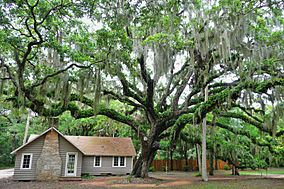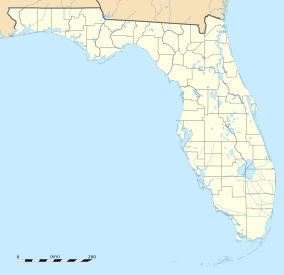Washington Oaks Gardens State Park facts for kids
Washington Oaks Gardens State Park is a special place in Florida. It's a state park located near Palm Coast, Florida. You can find it right along A1A, a famous road in Florida.
This park is well-known for its beautiful, planned gardens. But it's also important because it protects the natural environment of a barrier island in northeast Florida. A barrier island is a long, narrow island that protects the mainland from ocean storms.
Quick facts for kids Washington Oaks Gardens State Park |
|
|---|---|
|
IUCN Category V (Protected Landscape/Seascape)
|
|

Visitor center alongside live oak tree
|
|
| Location | Flagler County, Florida, USA |
| Nearest city | Palm Coast, Florida |
| Governing body | Florida Department of Environmental Protection |
|
Washington Oaks Historic District
|
|
| Lua error in Module:Location_map at line 420: attempt to index field 'wikibase' (a nil value). | |
| Nearest city | Palm Coast, Florida |
| Area | 21 acres (8.5 ha) |
| Built | 1936 |
| Architectural style | Modern Movement |
| NRHP reference No. | 09000400 |
| Added to NRHP | September 30, 2009 |
Contents
Exploring Park Habitats
The park protects several different natural areas, called habitats. These habitats include sandy beaches and coastal scrub lands. There are also coastal hammocks and tidal marshes.
- A scrub habitat has dry, sandy soil and short, tough plants.
- A hammock is a patch of land that is a bit higher than the surrounding area. It usually has different kinds of trees.
- Tidal marshes are wet, grassy areas that are flooded by ocean tides.
Amazing Plants of the Park (Flora)
The park is home to many types of plants, also known as flora. You can see large southern live oaks with their sprawling branches. There are also beautiful magnolia trees and different kinds of hickory trees.
You'll also find tall cabbage palmettos, which are Florida's state tree. Shorter saw palmettos grow closer to the ground. In the formal gardens, you can enjoy colorful roses, camellias, and azaleas.
Wildlife You Might See (Fauna)
Many animals, or fauna, live in Washington Oaks Gardens State Park. If you're lucky, you might spot a sea turtle on the beach. Florida gopher tortoises dig burrows in the sandy soil.
In the water, you might see gentle West Indian manatees. On land, look for white-tailed deer, raccoons, and even bobcats or foxes. Other common animals include Virginia opossums and eastern gray squirrels.
The park is also a great place for birdwatching. You could spot a large pileated woodpecker or a bright red northern cardinal. Majestic bald eagles and speedy peregrine falcons fly overhead. Keep an eye out for the unique Florida scrub jay, a bird found only in Florida.
A Look Back at the Park's History
The land where the park sits has a long and interesting past. Long ago, Native Americans used this area for hunting and fishing.
Later, after Europeans came to Florida, the land was owned by different people. It was used for farming various crops. One owner was a surveyor named George Washington. He was a relative of President George Washington.
In 1936, a woman named Louise Powis Clark bought the property. She was the wife of a businessman named Owen D. Young. They wanted the property as a winter home for their retirement. Louise Clark gave the place its name, "Washington Oaks." She was also the one who created the beautiful formal gardens, citrus groves, and the house.
After her husband passed away in 1962, Mrs. Young gave the property to the State of Florida in 1964. She wanted to make sure that the gardens would always be kept just as they were.
Fun Things to Do at the Park
Washington Oaks Gardens State Park offers many activities. You can enjoy the beaches on both the Matanzas River side and the Atlantic Ocean side. It's a great place for bicycling and fishing.
There are also trails for hiking and nice areas for picnicking. Of course, it's a wonderful spot for wildlife viewing. The original house on the property is now a visitor center. It has exhibits that teach you about the park's history and nature.
Park Hours and Entry Fees
Florida state parks are open every day of the year, including holidays. They open at 8 a.m. and close at sundown. There is a small fee to enter the park.
Gallery
-
Natural artesian spring
 | Bayard Rustin |
 | Jeannette Carter |
 | Jeremiah A. Brown |






